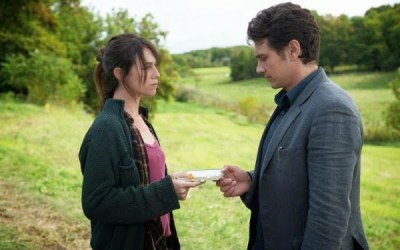In Wim Wenders’ facile return to narrative filmmaking, Every Thing Will Be Fine (2015), all of life’s problems can easily be resolved by a good old-fashioned hug. Loaded with unremarkable statements on moral resolve and brimming with arrogance, this desultory study of grief and the need for an artist to suffer in order to create great art is as hollow and throwaway as the redundant platitude it derives its name from. Unfolding via an elliptical narrative that fades in and out of time like a flashback of all the unremarkable moments you’d ordinarily forget, Every Thing Will Be Fine follows the misfortunes of Tomas Eldan (James Franco), a misanthropic writer struggling to come to terms with the death of a child.
Tomas wasn’t to blame for the accident, yet he feels responsible for the emotional fallout of his actions and the relationship with his girlfriend Sara (Rachel McAdams) collapses under the burden of his guilt. However by seeking refuge in his work he begins to gain greater success as a novelist – success that some believe is directly linked to the fateful night of the incident. Observing the trajectory of his life over twelve years, Wenders attempts to capture the full extent of Tomas’ inner turmoil charting the peaks and troughs of a life spent riding an inescapable wave of guilt. Whilst demonstrating traces of the formal dexterity that’s so admirable in his previous work, Every Thing Will Be Fine feels like a crude approximation of the beauty that flickered so effortlessly in films like 1984’s Paris, Texas.
Franco’s tortured writer is immune to sentimentality, a cold disagreeable protagonist that radiates little warmth. To counteract the tedious benignity of his life Alexandre Desplat’s orchestral score is forced to work overtime, with every stirring of emotion signposted by a crashing crescendo of strings. If that wasn’t enough, Wenders ensure we understand the magnitude of these events, guiding us by the hand with invasive zooms that attempt to force us into the private world of his characters. From the laughable holistic self-scrutiny of Charlotte Gainsbourg’s grieving mother Kate and McAdams’ affected pan-European accent, to Franco’s clichéd portrait of a writer oh so poignantly at war with his demons (the irony in his assertion of complete ambivalence towards Faulkner’s writing is particularly amusing), each character feels like a caricature of some fleeting emotion fleshed out and rendered inanimate by a script littered with contrivances.
This ambivalence to character, coupled with a persistently sullen atmosphere and rote editing techniques makes the film’s constancy shifting chronology hard to follow, with few mnemonic devices or period touchstones available to anchor the film in any particular period of time. It’s clear that Wenders is attempting to demonstrate that time isn’t the great healer it’ purported to be yet his message is so childishly apparent from the beginning that the film quickly becomes a chore. A larger search for spiritual absolution is inferred by the additional dimension the 3D adds, yet whilst an imaginative use of a otherwise spectacle driven device this bold creative decision fails to coalesce with the film’s morose tone. Ultimately, the optimism inferred within Every Thing Will Be Fine’s disingenuous title has done little to save this bloated search for forgiveness from descending into smug, unbearable melodrama.
The 65th Berlin Film Festival takes place from 5-15 February 2015. For more of our coverage, simply follow this link.
Patrick Gamble | @PatrickJGamble



